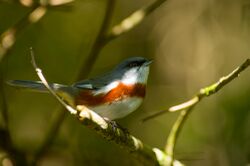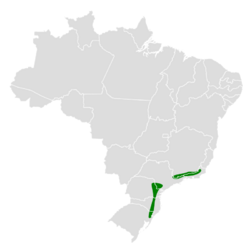Biology:Bay-chested warbling finch
| Bay-chested warbling finch | |
|---|---|

| |
| Scientific classification | |
| Domain: | Eukaryota |
| Kingdom: | Animalia |
| Phylum: | Chordata |
| Class: | Aves |
| Order: | Passeriformes |
| Family: | Thraupidae |
| Genus: | Castanozoster Burns, Unitt & Mason, 2016 |
| Species: | C. thoracicus
|
| Binomial name | |
| Castanozoster thoracicus (Nordmann, 1835)
| |

| |
The bay-chested warbling finch (Castanozoster thoracicus) is a species of bird in the family Thraupidae. It is endemic to southeastern Brazil .
Its natural habitats are temperate forests and subtropical or tropical moist montane forests.
Taxonomy
The bay-chested warbling finch was formally described in 1835 by the Finnish naturalist Alexander von Nordmann from a specimen collected in Brazil. He coined the binomial name Frigilla thoracica.[2] This species was traditionally placed in the genus Poospiza.[3] A molecular phylogenetic study published in 2014 found that the genus was polyphyletic.[4] In the subsequent reorganisation the bay-chested warbling finch was moved to its own newly erected genus Castanozoster. The name combines the Ancient Greek καστανό meaning "chestnut" with ζωστήρ meaning "belt".[5][6] The bay-chested warbling finch is monotypic: no subspecies are recognised.[6]
References
- ↑ BirdLife International (2016). "Castanozoster thoracicus". IUCN Red List of Threatened Species 2016: e.T22723214A94808124. doi:10.2305/IUCN.UK.2016-3.RLTS.T22723214A94808124.en. https://www.iucnredlist.org/species/22723214/94808124. Retrieved 12 November 2021.
- ↑ Nordmann, Alexander von (1835). Erman, Adolf. ed (in German). Reise um die Erde durch Nord-Asien und die beiden Oceane, in der Jahren 1828, 1829 un 1830 ausgeführt. Naturistoricher Atlas. Berlin: G. Reimer. p. 10, Plate 4 fig. 1. https://books.google.com/books?id=ECdRAAAAcAAJ&pg=PA10.
- ↑ Paynter, Raymond A. Jr, ed (1970). Check-List of Birds of the World. 13. Cambridge, Massachusetts: Museum of Comparative Zoology. p. 117. https://www.biodiversitylibrary.org/page/14483352.
- ↑ Burns, K.J.; Shultz, A.J.; Title, P.O.; Mason, N.A.; Barker, F.K.; Klicka, J.; Lanyon, S.M.; Lovette, I.J. (2014). "Phylogenetics and diversification of tanagers (Passeriformes: Thraupidae), the largest radiation of Neotropical songbirds". Molecular Phylogenetics and Evolution 75: 41–77. doi:10.1016/j.ympev.2014.02.006. PMID 24583021. https://digitalcommons.lsu.edu/cgi/viewcontent.cgi?article=3613&context=biosci_pubs.
- ↑ Burns, K.J.; Unitt, P.; Mason, N.A. (2016). "A genus-level classification of the family Thraupidae (Class Aves: Order Passeriformes)". Zootaxa 4088 (3): 329–354. doi:10.11646/zootaxa.4088.3.2. PMID 27394344.
- ↑ 6.0 6.1 Gill, Frank; Donsker, David; Rasmussen, Pamela, eds (July 2020). "Tanagers and allies". IOC World Bird List Version 10.2. International Ornithologists' Union. https://www.worldbirdnames.org/bow/tanagers/.
External links
Wikidata ☰ Q570454 entry
 |


